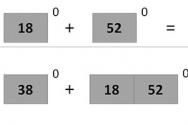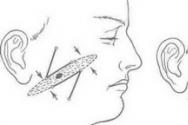Social and personal status of the individual. Attributed status
Rights, duties, responsibilities are the main facets of the social structure.
Types of status: main status, personal and social status, mismatch of statuses, ascribed (innate) status, achieved, mixed.
Teacher's word
The building blocks of social structure are statuses and roles, which are interconnected by functional relationships. They are perfect for this.
The word “status” came to sociology from the Latin language. IN Ancient Rome it denoted a state, legal status legal entity. However, at the end of the 19th century, the English historian Maine gave it a sociological sound.
Status - social status person in society. Social status is a generalized characteristic covering profession, economic status, political opportunities, demographic properties of a person (age, nationality).
(Students give examples of characteristics that describe the social position of the same person, but from different sides.)
Each position or cell is endowed with a range of prescribed rights, duties and responsibilities.
Responsibilities prescribe what a bearer of a given status must certainly do in relation to other bearers.
Rights say what a person can freely do or allow in relation to other people.
Responsibilities are strictly defined. They limit behavior to certain limits.
Can these facets exist separately? (Give examples, try to describe the distribution of rights and responsibilities of a slave in the ancient world, during Russian Empire, Soviet Russia).
So, we have examined the “building blocks” of the social structure of society. Now let us turn directly to the concept of “status” and its types.
Status is a certain position in the social structure of a group or society, connected to other positions through a system of rights and responsibilities.
Any person holds several positions, as he participates in many groups and organizations.
(Example: Mr. N. is a man, a teacher, a middle-aged person, a candidate of science, secretary of the scientific council, head of a department, a member of the Republican Party, Orthodox, voter, husband, father, etc.). Those. each person can be characterized by a status set (This term was introduced by the American sociologist R. Morton.)
Status set is the totality of all statuses occupied by a given individual.
Describe the full set of statuses for yourself and your parents.
In this set of statuses there is always a key, or main one.
The main status is the most characteristic status for a given individual, by which others distinguish him or with which they identify him.
The main thing is the status that determines the lifestyle, circle of acquaintances, and behavior.
What status is most important to me at the moment? For you?
For the scientific intelligentsia, the main thing is often not the place of work or occupation, but academic degree, for a man - rather a status associated with the main place of work or occupation.
Determine your main status, as well as the main statuses of your parents and acquaintances. It is also necessary to distinguish between two types of status - personal and social.
Social - the position of a person that he automatically occupies as a representative of a large social group (professional, class, national).
Personal status is the position that a person occupies in a small group, depending on how he is assessed by his individual qualities. Personal status plays a primary role among familiar people. For people we know, it is not the characteristics of where you work and your social status that are important, but our personal qualities.
Each of us has a set of social and personal statuses as we participate in many large and small groups. The latter include family, a circle of relatives and acquaintances, a sports team, a school class, a hobby club, a youth get-together, etc. In them you can have high, medium or low status.
Please give examples when a person can have different statuses? (For example, doctor N. has a high professional status, since his specialty is prestigious, but in the sports section where he practices, he has an average status). Those. social and personal may or may not coincide.
Now let's look at an example.
Mr. N. as a collector is valued very highly among stamp collectors, but his colleagues at his main place of work consider him a very mediocre accountant, and in his family his wife and children even look down on him. It is clear that N. has three different statuses, having three different ranks.
Status discrepancy is essentially a discrepancy in the ranks of statuses or a contradiction in rights and obligations. A discrepancy therefore arises under two circumstances:
1. When an individual occupies a high position in one group and a low position in another.
2. When the rights and duties of one status conflict or interfere with the exercise of the rights and duties of another status.
So, a discrepancy between statuses can also manifest itself in the behavior of the status holder and the expectations of others. So, no one expects a banker to beg for alms or ride on the steps of a tram. When this happens, a discrepancy between status and corresponding role behavior is revealed. Status and role came into conflict. In addition to the types of status considered, there are others.
Ascribed is the status into which a person is born or which is assigned to him over time (i.e. socially acquired).
The ascribed status does not coincide with the innate one. Only three social statuses are considered innate: gender, nationality, race (i.e. biologically inherited); (negro - innate, characterizing race; man - innate, describing gender; Russian - innate, showing nationality).
Significantly different from ascribed - achieved.
Achievable is a status that a person receives through his own efforts, desire, free choice, or is acquired through luck and luck.
(We give examples: the profession of an engineer, the status of a world champion, doctor of science, etc.)
Sometimes it is very difficult to determine what type a particular status belongs to. (For example, being unemployed is not a position that most people aspire to.)
Political turmoil coups d'etat, social revolutions, wars can change or even cancel some statuses of huge masses of people against their will and desire.
(Give examples from the history of Russia).
Dramatic changes can also occur at the individual level. Let's say that at the age of 30 a person became disabled. What is the status here? we're talking about? (Students are looking for answers).
Let's look at another example. The title of academician is at first achievable, but later it turns into an ascribed one, because is considered lifelong.
The cases described above can be classified as mixed. It has the features of both ascribed and achieved statuses.
The lesson ends with an analysis of tasks (as reinforcement).
Determine which of the three types of status—ascribed, achieved, or mixed—the following positions belong to: “policeman,” “chief,” “stoker,” “American-born Chinese,” “astronaut,” “count,” “child,” “ student", "professor", "people's deputy", "admiral", "world record holder", "emperor", "chapter catholic church", "husband".
Homework is to create 2-3 examples of types of statuses.
Svetlana ZUBRILINA, history and social studies teacher
This group includes gender, nationality, and race. Skin color is “prescribed” by nature. It cannot be changed unless a special and very expensive surgical operation is performed. The same is true with gender. Nature predetermined it for us. But the status of a king is not a natural, but a social predestination. Society prescribed it to us. The status of a king is inherited, and inheritance is one of the important socio-political institutions of society.
Skin color would have no meaning if people did not assign it a social attribute. What difference does it make whether you are white or black? For people, the personal qualities and dignity of a person are more important. Nevertheless, since ancient times, man has managed to turn biological attributes into signs or even the basis for social inequality. Even in the era of chiefdoms, only a person with smooth and healthy skin was chosen as the head of the tribe. Of course, in addition to other necessary qualities: wisdom, oratory, fearlessness.
Negro is a biologically innate status in the sense that it is impossible to change the color of the skin and the associated physiological characteristics of the body. However, the black man in the USA, South Africa and Cuba are different social statuses. In Cuba, as in most countries, the Negro, a representative of the indigenous population, which constitutes the absolute majority, has equal rights with others. In South Africa, as in Cuba, blacks are the main population, but during the apartheid period they were subjected to political and social discrimination. In the United States, blacks are a minority of the population, but the legal situation in a certain historical period was reminiscent of the situation in South Africa.
The process of attributing inequality to different statuses began some time ago and continues to this day. In this sense, it is an unfinished process. A homeless person is a sign of a social outsider. The rank of this status is very low. Although in some cases there is no shame in being a person without a fixed place of residence. For most of history, humanity did not have passports, which legally bind you to one single place in social space. One can name many social groups, such as traveling musicians or gypsies, which by old Soviet standards fall under the category of homeless people.
So the attribution is:
1. A universal feature characteristic of all cultures and eras.
2. A specific property that differs in different cultures and in different historical eras.
3. A purely social characteristic not found in nature.
4. An unfinished sociocultural and historical process.
Attributed is a status the possession or change of which is beyond our control, depending either on the nature or on the institution of inheritance (a prince will become a king). Biological inheritance - race, nationality. Society allows you to inherit titles (title of nobility). Negro is a biological status. What makes one social status is the position of that status in society (being treated as a second-class citizen in Brazil). Thus, the biological essence is superimposed social characteristics. The property of ascribing, that is, giving one or another sociocultural meaning, is inherent only in human society. All natural phenomena, getting into public circulation, undergo the procedure of attribution, that is, endowing them with a new quality that they did not have before.
For example, workers in the 18th century are losers (beggars, homeless people, vagabonds, social outsiders). In Soviet times, workers were the main category of the population, their status rose, they had their own party, which not only expresses their ideas, but also dictates its views to the entire population in the field of art and education; their views are the dominant ideology in society. In order to obtain worker status, it became necessary to study.
Two biologically equal sexes - a man and a woman, once in a social environment, are endowed with different meanings, that is, they are assigned different social qualities. As a result, biological sex turns into a social gender - gender. Society crossed out what nature prescribed for it and created a new structure of relations between the two sexes, turning them into social characteristics, social statuses. Feminism advocates a redistribution of roles between men and women. The essence of this movement is the equalization of the rights of the two sexes and the elimination of social discrimination, but not at all the dominance of one of the sexes over the other. Feminism does not advocate for women to be at the head of the entire social pyramid.
The ascribed statuses also include the status of the first-born.
Cult of the firstborn
In a patriarchal society, the cult of the firstborn dominates family relationships over everything: “My firstborn! You are my strength and the beginning of my strength, the height of dignity and the height of power.” As a rule, it is he who often gets everything: “may the nations serve you, and may the tribes bow to you; be lord over your brothers, and let your mother’s sons worship you.” Even Israel is distinguished from other nations precisely on the same basis: “Israel is My son, My firstborn.” The first-born is assigned the right to a double share of the inheritance, even if he is the son of an unloved wife.
Therefore, it is no coincidence that one of the most terrible punishments that falls on Egypt, which refuses to let go of God’s chosen people of Israel, is the death of all the firstborn.
"Plagues of Egypt"
Thus says the Lord: At midnight I will pass through the midst of Egypt, and every firstborn in the land of Egypt will die, from the firstborn of Pharaoh who sits on his throne, to the firstborn of the bondwoman who is at the millstone, and all the firstborn of the livestock; and there will be a great cry throughout all the land of Egypt, such as has never happened and such as will never happen again...
Thus, it is not surprising that brothers (especially stepbrothers) do not always have warm feelings for the first-born.
An interesting idea about the eastern version of seniority is expressed by A.I. Kravchenko.
East. Clans
In the West, families do not represent branched kinship systems of 200 or 300 people. Only in the East is such a concept as a related clan, a system of relatives, applicable. And this system is headed by a head, a master, an elder. He was once the eldest son, and all ties are tied to him: economic, economic, political. He marries, divorces, he solves all problems, he expels people from his clan. He solves all problems and transfers his rights to his eldest son before his death. He can have 10 wives, but only the eldest son from one wife receives these rights.
So, when a new relative takes the post of “eldest son” and acquires status, he is not very happy. It would seem, rejoice, you are now the supreme ruler of your small state. But with rights comes a lot of responsibilities. For example, you need to find jobs for your entire family. What are they doing in Transcaucasia and Central Asia? As soon as one gets into some good position, he immediately attracts everyone. So he is obliged to take care of everyone. And if he didn’t take care of someone, they say to him: “Listen, what kind of eldest son are you? You are now the head of the clan, you must perform this function.” He must devote his entire life to linking relationships within this family: political, economic, legal, social, family, and whatever. And here he is, like a ruler, his whole day is scheduled: who comes to him when, what issues to resolve. This is what the status of “eldest son” is.
However, one cannot think that this order of inheritance does not have positive traits. We remember that ancient law is consolidated in the system of primogeniture. This system allows:
- Firstly, maintain an orderly system of hierarchical relationships that have developed in society, because if each of the sons inherits a title, then very soon everyone will become dukes and princes, which, of course, will not benefit society;
- Secondly, do not split large estates into pieces, which is beneficial for the economy. In addition, younger brothers, as mentioned earlier, when reviewing historical personality types, are forced to go into service. This entails the emergence of a whole class of professional military men, lawyers, doctors, professors, office workers, etc. and so on. It is clear that all this opens up new opportunities in the development of society.
- finally, thirdly, as we have already seen, this system makes it possible to generate great culture, to form a special type of personality, which sets the tone in the formation of a person to this day.
So, ascribed is a status in which a person is born (innate status), but which is later necessarily recognized as such by society or a group. Thus, the Negro is not only a born (given by nature), but also an ascribed status. Imputed and innate statuses include: “member of the royal family”, “descendant” noble family" etc. They are innate because royal and noble privileges are inherited by the child as a blood relative. The status of the supreme ruler, that is, the title of king, passed to the son by right of birth, just as the status of chief was inherited in chiefdoms. However, the liquidation of the monarchical system and the destruction of noble privileges indicate the relativity of such statuses.
The innate status must be reinforced in public opinion, the social structure of society, and be entrenched in its norms. Only then will it be innate and ascribed at the same time.
The kinship system gives a whole set of innate and ascribed statuses: son, daughter, sister, brother, mother, father, nephew, aunt, cousin, grandfather, etc. Blood relatives receive them. Non-blood relatives are called in-laws. The mother-in-law is the “mother-in-law”, the father-in-law is the “father-in-law”. IN English language That's what they're called. These are ascribed, but not innate, statuses, because they are acquired through marriage. These are the statuses of stepson and stepdaughter obtained through adoption.
Achieved status
If ascribed is any status acquired against one's own will, over which the individual has no control, then the achieved status is acquired as a result of free choice, personal effort and is under the control of the person. These are the statuses of president, banker, student, professor, Orthodox Christian, member of the Conservative Party and many others.
The achieved status is not subject to automatic transfer; it can only be earned by making efforts and demonstrating one’s merits and talents. Acquired statuses include the status of professor, artist, artist. It can only be achieved through personal labor, the acquisition of special knowledge, and often requires personal charisma. The number of social statuses increases in proportion to the complexity of the social structure. More developed and more complex societies provide the individual with greater freedom of choice. In such a society, in particular, the number of acquired statuses increases. IN modern world we can choose whether to marry and have children, that is, even such statuses as spouse and parent are essentially acquired. People in traditional societies have less freedom of choice when it comes to marriage and procreation.
Sometimes it is quite difficult to draw the line between ascribed and achieved statuses. For example, although we choose our college (from those we applied to and were accepted to) or our job (from where we applied and where we got it), our success is largely influenced by our family background and social background. And even despite the fact that in American culture the personal achievements of a person who makes his own way in life (“self-made man”) are highly valued, a representative of the middle or upper class has more to count on success than someone from the lower classes. The statuses of husband, wife, godfather and mother are attainable because they are obtained at will. However, sometimes people become husbands against their will.
Previously, some positions could only be held by men, for example, policeman, soldier, general. These are ascribed statuses. But when women were allowed to serve in the police and army, status became attainable. The Pope is a male-only position.
Note. IN modern society, unlike previous formations, prescribed statuses play a much smaller role and achieved ones play a larger role. This is because opportunities for social mobility are much greater today than in the past. Therefore, a person’s origin is no longer able to predetermine his entire life; much of it depends on the personal qualities of the individual.
Mixed status
Sometimes it is very difficult to determine what type a particular status belongs to. For example, being unemployed is not a position that most people aspire to. On the contrary, they avoid him. Most often, a person finds himself unemployed against his will and desire. The reason is factors beyond his control: an economic crisis affecting an industry or society as a whole, mass layoffs, the ruin of a company, structural restructuring of production. Such processes are not under the control of an individual. It is in his power to make efforts to find a job or not to do so, resigning himself to fate.
The status of unemployed, if it was obtained not voluntarily, but as a result of a massive reduction in production or an economic crisis, is considered mixed.
Mixed statuses include those positions that cannot be unambiguously classified as either achieved or prescribed, because they contain both.
1. Achievable at the request of a person and becoming a lifer: Hero Soviet Union, Chevalier of the Legion of Honour, Academician, King, Knight of the British Empire, Olympic Champion, etc.
2. Achieved against desire, but at the same time, possessing the features of the prescribed, since the owner cannot change the status rights and obligations. Examples: convicted, disabled, unemployed, “reluctant husband.”
3. Achieved by a confluence of independent circumstances, and at the same time possessing the characteristics of the prescribed: the son of an oligarch who inherits his father’s wealth; the son or daughter of a famous artist, “movie stars” who inherit his profession;
The criterion for mixed status can also be:
– the impossibility, at will, of changing the rights and obligations prescribed by the achieved status or of abandoning them: monk, convict, disabled...
– the impossibility of depriving a lifelong holder of the status of the corresponding rights and privileges (deprivation of titles, orders, etc.), if their holder does not violate laws or status obligations.
True, history shows that political upheavals, coups d'etat, social revolutions, wars can change or even abolish some statuses of huge masses of people against their will and desire. After the October Revolution of 1917, former nobles turned into emigrants, remained or became officials, engineers, workers, teachers, losing the ascribed status of a nobleman, which had disappeared from the social structure. In the early 90s, party committees were liquidated at enterprises and institutions and thousands of people left the Communist Party.
Dramatic changes can also occur at the individual level. Let's say that at the age of 30 a person became disabled. His socio-economic situation has changed significantly: if previously he earned his bread on his own, now he has become entirely dependent on state assistance. What status are we talking about here? It is difficult to call it achievable, since no one wants to become disabled of their own free will. He might be considered imputed, but a 30-year-old cripple is not disabled by birth. He became disabled as a result of a combination of circumstances that were beyond his control.
If socio-demographic restrictions are imposed on the occupation of a particular position, then it thereby ceases to serve as an achieved status.
All social statuses can be divided into two main types: those that are prescribed to the individual by society or a group, regardless of his abilities and efforts, and those that the individual achieves through his own efforts. Prescribed statuses and roles. Since society is a complex entity, its institutions function effectively only if people perform a huge number of responsibilities every day, strictly defined within group and intergroup relations. The simplest way to achieve coordinated performance of duties is to divide all activities into a set of prescribed roles and teach each individual, from the moment of his birth, a predetermined set of roles. After the first role training, which begins at early childhood, the prescribed roles must be assigned according to certain criteria known as the "pathway to success." Poly age is universally used in society as the basis for role prescription. Race, nationality, class and religion are also used in many societies as the basis for prescribed roles. Although role learning is most often unconscious, it does not make it any less real."Adults ask little boys what they want to be when they grow up. At the same time, adults ask little boys girls, where did they get such a nice dress? Despite their young age, boys are primarily concerned with their careers, while girls are absorbed in “planting” bait for men!” - one famous American teacher-researcher wittily remarked (169, p. 107). It is no coincidence that since childhood, the main and largest part of the processes of personal socialization consists of teaching various types of social actions to both men and women. Little girls play with dolls, help their mother with housework and are rewarded for this praise from adults. Training a girl to be a tomboy, although tolerable, is considered bad manners. Boys believe that dolls are intended only for girls and very young children, and therefore the worst thing for them is to be known as a “mama’s boy” or a “girl.” Experience shows that years of separate education for boys and girls results in them having different abilities, feelings and preferences in adulthood. mature age gender differences and roles are clearly defined, and the process of role learning becomes more complex. A woman, for example, can simultaneously act in the roles of wife, mother, citizen, etc. Her role as wife and mother includes many different roles simultaneously, each of which is inseparable from and grows into the other. Most functions can be performed quite well by both women and men if they are socialized to accept their inherent tasks. Thus, in Pakistan, domestic servants are traditionally represented by males; in the Philippines all secretaries are men; in the Marquesas Islands, children work around the house, lay the table, prepare food, and women embroider; In many countries around the world, heavy agricultural work is performed predominantly by women. The definition of male and female roles is subjective and depends on the specific place and time. Every society has customs, traditions and norms regarding the performance of male and female roles. Individuals can afford to bypass some elements of these traditions and customs, but they risk being alienated from society until they perform these roles in accordance with their gender. Few individuals ignore these demands? for example, becoming homosexuals or lesbians, since such deviations from prescribed roles are condemned by society. The roles of men and women in society change over time. The possibility of replacing heavy manual labor with machine labor, the use of contraceptives, and the resulting reduction in family size and household responsibilities have greatly reduced the differences between male and female roles. Women, for example, have become actively involved in the production process and have statuses that were previously considered masculine. For any society, it is equally important to prescribe roles in accordance with age. Adaptation of individuals to constantly changing ages and age statuses is an eternal problem. Before an individual has time to adapt to one age, another one approaches, with new statuses and new roles. As soon as the young man begins to cope with the embarrassment and complexes of youth, he is already on the threshold of maturity; As soon as a person begins to show wisdom and experience, old age comes. Each age period is associated with favorable opportunities for the manifestation of human abilities, moreover, it prescribes new statuses and requirements for learning new roles. At a certain age, an individual may experience problems associated with adapting to new role-status requirements. A child who is said to be older than his age, i.e. has achieved the status inherent in the older age category, usually does not fully realize his potential childhood roles, which negatively affects the completeness of his socialization. This is often how children feel lonely and damaged. On the other hand, immature adult status is a combination of adult status with attitudes and behavior characteristic of childhood in adolescence. Such a person usually has conflicts when playing roles appropriate to his age. These two examples so far; give an unsuccessful adaptation to the age statuses prescribed by society. In our society, unsuccessful socialization in preparation for youth and old age is especially noticeable. Unlike primitive societies, we do not have clearly defined age statuses, with the exception of adulthood, which occurs at 18 years of age. Parents of boys and girls are in uncertainty about how mature a boy or girl is to consider, and they endlessly argue with their children about their choice of boyfriends and girlfriends, the time to return home, the use of money, marriage or marriage. But the fact is that the young man himself is in uncertainty regarding the scope of his efforts, the choice of path to achieve success in life, political views, circle of friends, etc. It is not surprising that a young person often gives in to difficult choices, preferring to remain dependent on parents or other relatives, which is typical at an earlier age. Old age in many primitive or traditional societies is respected and revered primarily because in such societies people mainly shape their behavior based on ancient and recognized customs and traditions, informal control over the observance of these traditions. However, in modern society, where ancient traditions do not play such a significant role, old age causes only inconvenience. A rapidly changing industrial society very rarely considers old people as a source of wise leadership. The prescribed role of older people has become to retire as their strength and abilities weaken, and their main function in later life is only to maintain their own existence. Therefore, the transition to the role of an elderly person in modern society is very painful and difficult for each individual. Gender and age are just two examples of many prescribed statuses. All such statuses exclude roles that can be successfully performed only when each individual is socialized to the prescriptions regarding these roles established in society. Achieved statuses and roles. Social position, which is secured through individual choice and competition, is defined as achieved status. If each individual has a certain number of prescribed statuses that are assigned to her in a group or society without taking into account her individual abilities or preferences, then the achieved statuses are fixed taking into account the abilities of this individual, her performance and, possibly, as a result of luck. This phenomenon is quite successfully described by M, Young: “Princess - this is a prescribed status. A girl with royal heredity may not hit her finger, but her future is still the future of a princess, and whether she is pretty or ugly, tall or short, smart or stupid, she will remain a princess. birth, they can only be acquired by individuals most suitable for this. To be a man is a prescribed status, depending on birth, but to be a husband is an achieved status, which does not automatically follow from the fact of being a man, but depends on it. male behavior in the future. Negro is a prescribed status, but policeman is an achieved status. No one is born a policeman. The formation of the achieved status is carried out through each individual’s own talent, choice or activity" (196, p. 90). In primitive, traditional societies, statuses are most often prescribed and someone’s occupation of a certain social position depends on birth. A man, for example, is prepared from birth to be a hunter, fisherman or warrior. In modern industrial societies there is greater freedom for an individual to occupy one position or another. This is largely due to the fact that for its successful functioning it requires very significant mobility of labor resources and therefore there is a clearly expressed orientation mainly towards the personal qualities of individuals, towards changing statuses in accordance with their efforts. Control. society for fairness in determining status gives a gain in the flexibility of that social system, which provides the opportunity to occupy a significant position for people who show the greatest talent for this. The price will be the lack of competitiveness of those who were not able to “find themselves” and are not able to adapt to new roles. This is expressed in an increase in the number of extra people who are not satisfied with the existing situation. The status achieved by an individual requires him to make a choice not only in the area of work, but also in friends, organizations, place of education and place of residence. Such actions of the individual lead to the fact that he receives statuses that were not determined in advance by his parents. In this case, the individual encounters situations that are significantly removed from the experience of his ancestors, which creates constant difficulties for him in taking on new roles. The prescribed and achieved statuses are fundamentally different, but despite this, they can interact and intersect. For example, it is much easier for a man to achieve the status of president or prime minister than for a woman. The same, albeit to a lesser extent, can be said about the possibilities of achieving high statuses by the son of a major leader, on the one hand, and the son of a peasant, on the other. The main social position in society (social class status) is partially prescribed (i.e., it reflects the status of the parents ) and partially achieved with the help of the abilities and aspirations of the individual himself. In many relationships, the boundary between prescribed and achieved statuses is purely arbitrary, but their conceptual separation is very useful for studying these social phenomena. The ideal of a society in which most statuses are attainable is the desire for people to occupy positions in accordance with their abilities. This not only allows high talent to shine, but also eliminates the opportunity to justify shortcomings. In a society where most statuses are prescribed, an individual cannot expect to improve his position. Those with low rewards or low prestige do not feel guilty about their low status. Each of them considers his role and his status to be correct, and the current state of affairs to be fair. Such an individual does not compare his position with the position of others. He is free from feelings of insecurity, ambitious discontent, or fear of losing his status. This occurs because the individual's socialization is not associated with the expectation of a change in status; he only learns and accepts the prescribed roles. At the same time, it is difficult to accept a low status if hereditary barriers are removed and opportunities are opened for everyone to express their abilities. If the acquisition of status occurs on the basis of competition and access to appropriate training is open to everyone, then the cause of low status can only be incapacity and incompetence. However, even in this case, mediocrity finds an opportunity to achieve high status, using preferential rights, group quotas, benefits, etc. The achieved status maximizes performance of roles based on individual abilities. The roles that accompany it are, as a rule, difficult to learn and often conflicting. The existing currently achieved statuses are probably associated with both the effective use of human potential and the greatest threat to the individual spiritual world of the individual in the event of unsuccessful socialization to the achieved roles. Role behavior. While the role is behavior , expected from an individual with a certain status, role behavior is the actual behavior of the one who plays the role. Role behavior differs from the expected in many ways: in the interpretation of the role, in personal characteristics that change patterns and patterns of behavior, in relation to a given role, in possible conflicts with other roles. All this leads to the fact that no two individuals play this role in exactly the same way. Not all soldiers are brave, not all priests are saints, and not all professors can serve as models in the matter of teaching. The diversity of role behavior can be significantly reduced when behavior is strictly structured, for example, in organizations where a certain predictability of actions can be observed even with the different behavior of its members. While role behavior usually consists of unconscious performance of roles, in some cases it is highly conscious; with this behavior, the person constantly studies his own efforts and creates the desired image of his own “I”. The American researcher I. Goffman developed the concept of dramatic role performance, which consists of highlighting a conscious effort to perform a role in such a way as to create a desirable impression on others. Behavior is regulated by compliance not only with role requirements, but also with the expectations of the social environment. According to this concept, each of us is an actor with different audiences. Children in the house, neighbors, work colleagues, students or schoolchildren - all of them, like many others, constitute different audiences. An individual, taking into account the specifics of the social communities surrounding him, presents himself differently when he is in a particular audience, acts in a role in such a way that he gives a dramatic picture of his “I”. The father scolds the children, the professor gives a lecture, the policeman controls traffic on the highway - everyone in a certain place and at a certain time is an actor who gives a performance in order to impress the audience (160).
Attributed and achieved statuses
A stable status terminology has not yet emerged in the domestic literature. Sometimes the same status is called differently. This happened with the terms “ascriptive status” and “achieved status”. In English, the word achieved status means something that has already happened, and is not continuing to happen. It is more logical to translate it as “achieved status”, and the term ascriptive status as “attributed status”. However, in domestic textbooks the latter is written as “prescribed,” that is, something accomplished, completed. Perhaps this is more convenient from the point of view of spoken language. But then the question arises: by whom or what is such a status prescribed to a person - nature, society, deity?
The group of prescribed statuses includes gender, nationality, and race. Skin color is “prescribed” by nature. It cannot be changed unless a special and very expensive surgical operation is performed. The same is true with gender. Nature predetermined it for us. But the status of a king is not a natural, but a social predestination. Society prescribed it to us. The status of a king is inherited, and inheritance is one of the important socio-political institutions of society.
Negro is a biologically innate status in the sense that it is impossible to change the color of the skin and the associated physiological characteristics of the body. However, blacks in the USA, South Africa and Cuba have different social statuses. In Cuba, as in most countries, the Negro, a representative of the indigenous population, which constitutes the absolute majority, has equal rights with others. In South Africa, as in Cuba, blacks are the main population, but during the apartheid period they were subjected to political and social discrimination. In the United States, blacks are a minority of the population, but the legal situation in a certain historical period was reminiscent of the situation in South Africa.
The process of attributing inequality to different statuses began some time ago and continues to this day. In this sense, it is an unfinished process. A homeless person is a sign of a social outsider. The rank of this status is very low. Although being a person without a fixed place of residence in some cases is, if not honorable, then at least not shameful. For most of history, humanity did not have passports, which legally bind you to one single place in social space. One can name many social groups, such as traveling musicians or gypsies, which by old Soviet standards fall under the category of homeless people.
Thus, attribution is: a) a universal feature characteristic of all cultures and eras; b) a specific property that differs in different cultures and in different historical eras, c) a purely social characteristic not found in nature; d) an unfinished sociocultural and historical process.
The concepts of “achieved” and “attributed status” in the modern sense were first used by the outstanding American anthropologist and sociologist Ralph Linton in 1936.
What conclusion should we draw? Apparently, the fact that in relation to this variety both names are equally applicable - prescribed and ascribed status. They can be used as synonyms, and there will be no mistake. These are the features of the translation into Russian of some foreign terms.
Attributed is a status the possession or change of which is beyond our control, depending either on the nature or on the institution of inheritance (a prince will become a king). Biological inheritance - race, nationality. Society allows you to inherit titles (title of nobility). Negro - biological status. What makes one social status is the position of that status in society (being treated as a second-class citizen in Brazil). Thus, social characteristics are superimposed on the biological essence. The property of ascribing, that is, giving one or another sociocultural meaning, is inherent only in human society. All natural phenomena, entering public circulation, undergo the procedure of attribution, that is, endowing them with a new quality that they did not have before.
Two biologically equal sexes - a man and a woman, once in a social environment, are endowed with different meanings, that is, they are assigned different social qualities. As a result, biological sex turns into a social gender - gender. Society crossed out what nature prescribed for it and created a new structure of relations between the two sexes, turning them into social characteristics, social statuses. Feminism advocates a redistribution of roles between men and women. The essence of this movement is the equalization of the rights of the two sexes and the elimination of social discrimination, but not at all the dominance of one of the sexes over the other. Feminism does not advocate for women to be at the head of the entire social pyramid.
So, ascribed is a status in which a person is born (innate status), but which is later necessarily recognized as such by society or a group. Thus, the Negro is not only a born (given by nature), but also an ascribed status. Ascribed and innate statuses include: “member of the royal family”, “descendant of a noble family”, etc. They are innate because royal and noble privileges are inherited by the child as a blood relative. The status of the supreme ruler, that is, the title of king, passed to the son by right of birth, just as the status of the chief was inherited in chiefdoms. However, the liquidation of the monarchical system and the destruction of noble privileges indicate the relativity of such statuses.
The innate status must be reinforced in public opinion and the social structure of society. Only then will it be innate and ascribed at the same time.
The kinship system gives a whole set of innate and ascribed statuses: son, daughter, sister, brother, mother, father, nephew, aunt, cousin, grandfather, etc. They are received by blood relatives. Non-blood relatives are called in-laws. The mother-in-law is the mother-in-law, the father-in-law is the father-in-law. These are ascribed, but not innate, statuses, because they are acquired through marriage. These are the statuses of stepson and stepdaughter obtained through adoption.
If ascribed is any status acquired against one's own will, over which the individual has no control, then the achieved status is acquired as a result of free choice, personal effort and is under the control of the person. These are the statuses of a president, a banker, a student, a professor, an Orthodox Christian, a member of the Conservative Party, and many others.
The achieved status is not subject to automatic transfer; it can only be earned by making efforts and demonstrating one’s merits and talents. Acquired statuses in a primitive community are the status of a healer, performer of ritual dances, and storyteller. A person can achieve the position of leader in a tribe either by earning it through his hard work and generosity, or by possessing charisma and special skills. Acquired tribal statuses include polygamist, warrior, shaman (magician), and merchant. The number of social statuses increases in proportion to the complexity of the social structure. More developed and more complex societies provide the individual with greater freedom of choice. In such a society, in particular, the number of acquired statuses increases. In the modern world, we can choose whether to marry and whether to have children, that is, even such statuses as spouse and parent are, in fact, acquired. People in traditional societies have less freedom of choice when it comes to marriage and procreation.
Sometimes it is quite difficult to draw the line between ascribed and achieved statuses. For example, although we choose our college (from those we applied to and were accepted to) or our job (from where we applied and where we got it), our success is largely influenced by our family background and social background. And even despite the fact that in American culture the personal achievements of a person who independently makes his way in life (“from rags to riches”) are highly valued, a representative of the middle or upper class has more to count on success than someone from the lower classes. The statuses of husband, wife, godfather and mother are attainable, since they are obtained at their own request.
Previously, some positions could only be held by men, for example, policeman, soldier, general. These are ascribed statuses. But when women were allowed to serve in the police and army, status became attainable. The Pope is a male-only position.
Status depends less on what a person does and more on what he is, who he is, especially if the status is ascribed (prescribed) rather than achieved. In this sense, there is no prescribed prestige. It can only be achieved. Although it is known that there are two types of statuses - ascribed and achieved.








